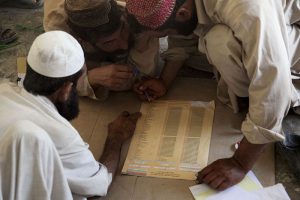The current conflict in Afghanistan is not only being fought on the battlegrounds, but also presents as a political rivalry over regime type between the government and the Taliban. The government emphasizes extending the political system that emerged in the aftermath of the 2001 U.S. invasion, which is theoretically based on electoral democracy, to the post-conflict Afghanistan. This means the government and its partners seek to maintain the current electoral system as the main mechanism for the distribution and balance of power. Furthermore, the government, referring to the constitution, claims itself as the sovereign authority in the country, one that is directly elected by the people and therefore represents the nation.
By contrast, the Taliban broadly presents their Islamic Emirate brand, which is principally a closed autocracy ruled by Islamic laws, as “the Islamic solution” to the country’s problems. The group, highlighting the government’s ineffectiveness in both governance and law enforcement in the past two decades, advertises its Islamic emirate as a religious-political entity that represents God’s sovereignty on earth and therefore an acceptable rule for the Muslim nation.
Without an agreement on regime type between the two parties, reaching a political settlement to end the conflict seems out of reach. Therefore, it is important to ask which party and regime type the people of Afghanistan support. Most Afghans initially supported and cherished the post-2001 political system, and preferred it to the Taliban’s Islamic Emirate, the current regime’s legitimacy has been drastically affected by flawed elections, weak governance, and increasing corruption. The very low turnout in the 2019 presidential elections was a clear indication of people’s declining trust in the system and its ability to produce effective results. Under this circumstance, the main question is whether the people still prefer the post-2001 political system to the Taliban’s Emirate.
A survey by the Afghan Institute for Strategic Studies examines, for the first time, the people’s views on regime type in the country. The survey, which was conducted in 34 provinces of Afghanistan, found that over 68 percent of respondents prefer the post-2001 political system compared to the Taliban’s Islamic Emirate. Over 80 percent of these respondents say they support and endorse the legitimacy of a political regime where the head of the state and the country’s leaders are directly elected by the people in a free and fair election. Over 80 percent of these respondents also support elements of a democratic regime such as women’s rights and liberties, social equality, and freedom of expression.
This finding shows that the people of Afghanistan support an electoral democracy and refuse the Taliban’s Emirate. It also challenges the conventional wisdom that suggests democratic values and processes are alien to and not supported by the people of Afghanistan, due to the tribal structure of the society. According to this assumption, democratic decay, on the one hand, and the growth of the Taliban, on the other, are outcomes of the people’s unfamiliarity with the Western notion of electoral government and their support for tribal and religious mechanisms of governance and legitimation. The new survey does not confirm this assumption. It shows that the past two decades of practicing democracy through voting, media, and civil society activities have significantly influenced people’s political choices. Despite the post-2001 political system’s inability to produce an effective government, the people still prefer it to the Taliban’s Emirate.
Peace talks between the Taliban and the Americans are expected to reach a conclusion soon and an “intra-Afghan dialogue” between the Taliban and other Afghan parties, including the government, is on its way. The Afghan people’s preference of political regime adds a significant variable to the process. Therefore, it is important for the government, the Taliban, and the United States’ envoy for the Afghanistan peace process, Zalmay Khalilzad, (who is supposed to supervise the peace process through its final stage) to include the public’s views as an important element in the talks. Including the people’s views could provide a common platform for reaching an agreement on regime type as a requirement of achieving a political settlement of the conflict.
Yaqub Ibrahimi is a lecturer in political science at Carleton University in Ottawa and a research fellow at the Afghan Institute for Strategic Studies based in Kabul. Ibrahimi’s current research interests include international relations theory, international security, fragile states, and conflict analysis.

































